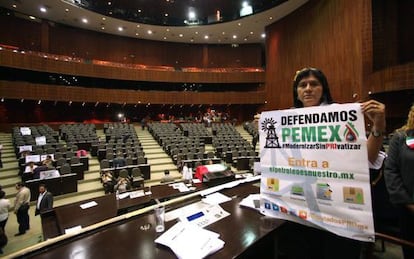Mexico changes its energy policy against the clock
In just 72 hours Mexico's Congress approved constitutional amendments to permit private sector investment in oil industry

Mexico's Congress approved a historic energy reform bill at breakneck speed. In 72 hours the joint initiative from the ruling Institutional (PRI) Revolutionary Party and the right-wing National Action Party (PAN) has succeeded in opening up the energy sector to private investors. The reform call for amendments in Articles 25, 27 and 28 of the Constitution in order to allow the state to offer contracts for services, licenses, and sharing the product and production lines with private companies. Having passed both the Senate and the Chamber of Deputies the measure now requires the approval of at least 17 of the 32 state legislatures before it is declared law.
The Chamber of Deputies passed the measure with 354 votes in favor and 134 against. The marathon session lasted 20 hours and during the debates the left accused the PRI and PAN of "selling our patrimony." Before the fiery discourse erupted, some representatives had taken over the lower chamber, locked its gates and blocked all access to it. The shut-down lasted 20 hours.
The debates had to take place elsewhere, in an auditorium nearby in an atmosphere of tension. Antonio García Conejo, representative from the leftist Party of the Democratic Revolution stripped down to his underwear to illustrate his argument. He said the reform law would fleece the country and leave it naked.
"I only have this left. They will not be able to strip me of this. They won't be able to do it," he said, while he took his clothes off. A few of the other representatives booed him.
Ricardo Monreal, the representative of Movimiento Ciudadano, or Citizen Movement, also took the opportunity to call the supporters of the reform "riffraffs" and "traitors." Representatives Karen Quiroga (PRD) and Landy Berzunza (PRI) were smacked as they got in line to speak.
The passage of the energy reform bill in three days by both legislative houses marks a record for Mexico's Congress in constitutional amendments, said Khemvirg Puente, a researcher in parliamentary affairs at the Universidad Nacional Autónoma de México. "The legislative process in Mexico is usually very slow. It usually drags on and sometimes it may take a full year for a bill to pass," he explained. Mexican lawmakers usually consult with experts and interest groups while writing the bill. Puente warms that this kind of quick handling could lead to legal errors in the text that may require corrections in the next few years.
The process officially began on Tuesday in the Senate. Lawmakers presented the initiative - the result of various negotiations between the PRI and PAN. The bill called for the maximum level of liberalization in the energy sector possible and the removal of the representatives of the workers' union from the board of the state-owned oil company, Petróleos Mexicanos, or PEMEX. According to Senator David Penchyna, one of the writers of the bill, the project had been in the works for the last 10 months. The left never had access to it.
The text set before the Senate for debate included important amendments such as the phrase "among others" in reference to the kinds of contracts that the state could offer private companies for the extraction of hydrocarbons, opening the door to practically any agreement. Another important change was the removal of the union's representatives.
Although the left opposed the project, PRI and PAN gathered enough votes to bring the measure to the floor in the Chamber of Deputies. Once the bill was on the agenda, the debate focused on attack against and defense of the government. "Although they say that talking about sovereignty is old-fashioned, this is a matter of national security, which is very much in vogue," said Amalia García (PRD).
Since he took office President Peña Nieto pressed for the reform as a way to restructure PEMEX. In the last year the company has registered more than 7.1 billion dollars in losses. And, production is in decline. Emilio Lozoya, head of PEMEX, joined the chorus for reform. Lozoya said PEMEX needs an influx of 60 billion dollars - a sum impossible to raise if the company continues to turn over 67 percent of its profits to the government.
The objective in Congress was to discuss and vote on the law before December 15th, the last day of the legislative term. The PRD accused PRI and PAN of bringing the bill to the floors just before the holidays so that people would not take the streets in protest. "They timed it really well," said Jesús Zambrano, PRD's president. The final passage came on December 12, the Day of the Virgin of Guadalupe, a holy day that many Mexicans observe although it is not a federal holiday.
Translation: Dyane Jean François
Tu suscripción se está usando en otro dispositivo
¿Quieres añadir otro usuario a tu suscripción?
Si continúas leyendo en este dispositivo, no se podrá leer en el otro.
FlechaTu suscripción se está usando en otro dispositivo y solo puedes acceder a EL PAÍS desde un dispositivo a la vez.
Si quieres compartir tu cuenta, cambia tu suscripción a la modalidad Premium, así podrás añadir otro usuario. Cada uno accederá con su propia cuenta de email, lo que os permitirá personalizar vuestra experiencia en EL PAÍS.
¿Tienes una suscripción de empresa? Accede aquí para contratar más cuentas.
En el caso de no saber quién está usando tu cuenta, te recomendamos cambiar tu contraseña aquí.
Si decides continuar compartiendo tu cuenta, este mensaje se mostrará en tu dispositivo y en el de la otra persona que está usando tu cuenta de forma indefinida, afectando a tu experiencia de lectura. Puedes consultar aquí los términos y condiciones de la suscripción digital.









































